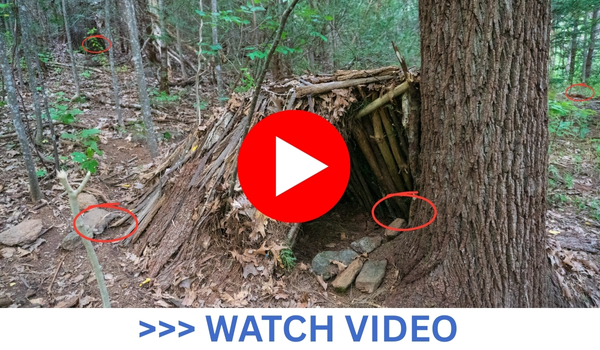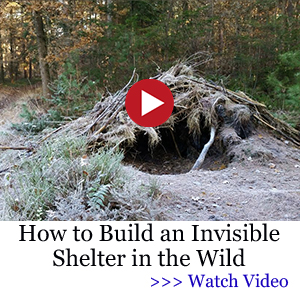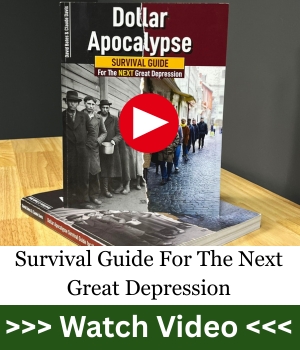When you’re out in the wild, things can go from “this is an adventure” to “this is a survival situation” incredibly fast. Maybe you got lost on a hike, or the weather turned bad unexpectedly, and now you’re on your own. Fear is a normal reaction in situations like these. You will feel it but you must be prepared to manage it effectively. What follows are the fundamentals of wilderness survival, and how you can dramatically increase your chances of escaping a scenario that can spiral into a tragedy faster than you think. Do you choose to ignore these essential elements? Well, good luck staying alive.
Shelter – Your First Line of Defense
Most people will die in the wild not because of wild animals, but because they underestimate the cold, the rain, the wind. When you’re stranded and night is falling fast, your body heat will vanish quicker than you ever thought possible. And without shelter, you won’t last long.
That’s where the lean-to shelter comes in – but don’t get too comfortable. It’s not luxury and it ain’t pretty. It’s your last line of defense against a brutal, unforgiving environment.
Your first move? Find a solid support beam. A fallen log, a rock ledge, anything sturdy enough to hold what little protection you can build. Without it, your structure will collapse. Next, scavenge for branches before darkness traps you. They need to be long and straight enough to prop up against your beam. You’re racing the clock now. Every second without shelter brings you closer to hypothermia.
Related: Shelter Mistakes That Can Get You Killed
Then, start covering it. Don’t stop at a thin layer. It won’t save you. Pile on leaves, moss, anything that’ll block the wind and soaking rain. You want insulation, not decoration. Forget aesthetics, because this is survival.
And whatever you do, don’t lie directly on the cold earth. It will steal your body heat mercilessly. Build a barrier – pine needles, leaves, anything soft – to stop the cold from creeping in and killing you while you sleep. This isn’t a project. It’s a warning. If you can’t build a lean-to, you may not make it through the night.
If there’s one thing you absolutely must be ready to do when you’re lost in the wilderness, it’s building a shelter. Failing to do this could cost you your life. Learn the critical basics in the video below, where you’ll find step-by-step instructions, and crucial mistakes to avoid, that could make the difference between life and death.
Water – Your Most Critical Need
Out here, water isn’t a resource. It’s your lifeline. While you might survive without food for weeks, going just a single day without water can send your body spiraling toward severe dehydration, confusion, and eventually death. And by the time the symptoms hit you… it might already be too late.
Your organs will begin to shut down, strength will fail you, and your decisions will falter. That’s the terrifying reality of being lost in the wild without water.
Your only hope? Start searching. Immediately. Look for natural water sources: rivers, lakes, streams. If you’re lucky enough to be in hilly terrain, follow the valleys. But don’t count on luck. Watch for green, dense vegetation or animal tracks, they might be your last clue before it’s too late.
 But what if there’s no stream, no lake, nothing but dry silence? You’ll have to get creative fast. Collect rainwater if it even rains. Stretch out plastic, a poncho, anything. If you miss your chance? Wake up before dawn and drag soaked cloth through tall grass to collect morning dew. It’s a desperate trick, but one that might buy you hours.
But what if there’s no stream, no lake, nothing but dry silence? You’ll have to get creative fast. Collect rainwater if it even rains. Stretch out plastic, a poncho, anything. If you miss your chance? Wake up before dawn and drag soaked cloth through tall grass to collect morning dew. It’s a desperate trick, but one that might buy you hours.
And whatever you do, never drink untreated water. Hidden bacteria and parasites can turn a hopeful sip into a death sentence. Boil it if you can. No pot or fire? Improvise with cloth and charcoal, but know you’re gambling every time. Because out here, you’re just one wrong move away from dying of thirst.
Prioritize access to water at anytime
Water isn’t just a survival priority in the wild. It’s your lifeline at home too. Problem is that you’re already in a race against time… and you’re losing.
Temperatures are rising. Droughts are spreading. Nature isn’t something you can beat. However, if you’re not prepared, it will break you.
When SHTF due to climate disasters, your tap will run dry, your well could fail, and bottled water will vanish in hours. No one’s coming to help. But there’s one smart move you can make before it’s too late.
This small-sized water generator could be the one thing standing between your family and a slow, brutal death from dehydration. It creates clean water straight from the air. Even when systems collapse.
No pipes, government, or luck needed. Just survival. Click here to see how it works, before the next heatwave makes you wish you had.
Food – The Fuel To Keep You Going
You can last a few days without food, but that doesn’t mean you’ll survive. When your body runs out of fuel, it shuts down. First your energy. Then your focus. Then your strength. And finally… your ability to fight for your life. If you’re not prepared to find or catch food fast, your chances plummet.
Sure, foraging sounds simple, until you’re in the wild, starving, and unsure if that plant you’re holding is dinner… or poison.
Unless you’ve studied edible plants in your region, you’re gambling with your life. One wrong bite could mean paralysis or worse.
That’s why real preppers don’t gamble with luck. They train, they prepare, and they rely on battle-tested sources. Not hearsay or guesswork. Because when you’re starving in the wilderness, reaching for the wrong plant isn’t just a mistake… it’s a death sentence.
There’s no room for uncertainty when survival is on the line. You need a guide that shows you exactly what to eat and what to avoid. That’s why “The Forager’s Guide to Wild Foods” by the renowned Nicole Apelian has become a must-have for those who want to outlive disaster.
This isn’t just a book – it’s a lifeline. It teaches you how to identify edible plants, mushrooms, lichens, even trees that can keep you alive when all else fails. Because when SHTF, you won’t have time to guess. You’ll need to know.
Keep in mind that plants alone won’t keep you alive. You need real protein. traps, and fishing skills. You also need to know how to turn scrap – like a safety pin or soda tab – into a working hook. Will you be able to feed yourself when the world goes silent? Because when everything collapses, the last thing you want is to starve to death surrounded by food you’re too afraid to eat.
👉 Master crisis food strategies from a former Navy SEAL – get 68% OFF now!
Fire – Nature’s Multi-Tool
Fire isn’t just a comfort. It’s a weapon against the elements, and without it, your situation can spiral fast. You might think you’re safe, but cold, rain, or wet clothes can change everything in a matter of minutes. Hypothermia doesn’t wait. And once your body temperature starts dropping, it becomes harder and harder to recover.
But the danger doesn’t stop there. Without fire, you can’t boil water, which means every sip could be loaded with invisible threats. Bacteria. Parasites. Organisms your body can’t handle when it’s already weak. One bad drink is all it takes to shut you down.
Related: How To Dig A Native American Dakota Fire Hole
Predators? Fire helps keep them away. The dark hides more than just shadows. Wild animals avoid flame, but without one, you might find yourself face-to-face with something that doesn’t. And if you’re waiting for rescue? Forget shouting. Forget hoping. Fire is your only real signal. Three flames in a triangle or straight line – it’s a global cry for help. But you need to know how to build them before panic takes over.
Matches get wet. Lighters run out. When you’re truly stranded, you’ll need to rely on your skills, not your gear. That’s why mastering friction-based methods like the bow drill isn’t optional. It’s essential. Start with dry tinded: leaves, bark, grass. Build up to kindling. Guard your flame with stones or shelter from the wind. And never let it go out. One moment of carelessness, one missed log, and your only lifeline is gone.
Navigation and Signaling – Finding Your Way Out
You’ve managed to secure shelter, water, food, and fire. But don’t let your guard down. Not for a second. You’re still exposed, still isolated. And the longer you’re out there, the greater the risk of never being found. The question now is: can you make it back, or will you vanish without a trace?
If you think someone might be looking for you, stay put. Wandering aimlessly is one of the most dangerous mistakes people make. But if there’s no sign of help… you’ll need to move. And every step could take you deeper into the unknown, unless you know how to navigate.
Start by locking your eyes on natural landmarks – mountains, rivers, or strange rock shapes. These are lifelines. Lose track of them, and you lose your only way back.
Follow the water – streams flow downhill. Downhill often leads to roads, towns – people. But only if you’re moving in the right direction. Guess wrong, and you could end up more isolated than ever.
The sun – it can be your compass, if you know how to read it. In the Northern Hemisphere, it rises in the east and sets in the west. At noon, shadows point north. But cloud cover, panic, or exhaustion can make even this simple trick unreliable if you haven’t practiced it. And if you’re staying in place? You’d better make yourself seen. Because if they can’t see you, they won’t even know where to look.
Related: Survival Skills You’ll Need After the Collapse
Fire is your beacon. Thick smoke made from damp wood or green leaves during the day can reach the sky but only if you keep the fire alive and burning.
No fire? Then light is your only hope. Reflect sunlight off anything shiny – a mirror, a metal surface, even a cracked phone screen. But you have to aim it precisely, or it’s useless.
Leave no doubt you’re out there. Spell out “SOS” with rocks, logs – anything that stands out. But remember: one mistake, one failed signal, and your window for rescue could close… permanently. The most dangerous choice? Not knowing when to move or stay. If rescuers are close, staying put is your best shot. But if you’re certain no one’s coming, staying still could mean getting stuck for good.
Final Thoughts
The wilderness isn’t just unpredictable – it’s merciless. If you’re not ready to act fast, things can spiral out of control before you even realize it. The truth is: most people don’t make it because they freeze, they panic, or they assume they’ll be rescued.
Every second counts in the first few hours. Every wrong move shrinks your window of survival. So ask yourself now: do you have the knowledge and a real plan for shelter, water, food, fire, and navigation? Because if you don’t, you’re not prepared. And in a real survival situation, that means one thing: you’re at the mercy of the elements, and they show no mercy.
You may also like:
11 Must-Have Items for Your Wilderness Survival Shelter
The Most Powerful 40 Remedies You Can Find in The Wild (Video)
Learn in 5 Minutes How to Whistle With Your Fingers Really Loud
























Hmm… Great points all around this article. Most of the time, we think of animals as the main dangers in the wild. But it’s also the simple things that can actually kill you. Strange how in the blink of an eye you realize you need to go back to basics just to avoid starving or dying of thirst. Food for thought.
Absolutely agree. It’s almost ironic, most folks prep for big threats like predators or disasters, but it’s usually the small, overlooked things that do the most damage out there. A twisted ankle, bad water, or not knowing how to make shelter before nightfall can turn a simple trip into a survival situation fast. Going back to basics isn’t just smart, it’s essential. Skills like finding clean water, making fire, and staying warm are what really keep you alive.
Howdy from high in the desert swamp,
I have been humbled and glad. I recently went out with the sole intent to build a shelter. It has been raining here a lot. Water is standing. One spot I had been eyeing to build a shelter was ideal..to me. I saw it last week after days of rain and saw it was not. Now that is filed under find multiple spots. I did find a high spot and set out to build a lean to. After about an hour I saw what I used to do rather quickly was going to take longer because of my age and injuries taking its toll. I did keep a steady pace and had one built. I crawled in and checked for sun light. None. Pull up a bunch of grass and old leaves for the floor and done. Good for the night if needed. Now build a fire. I did. Now for water. Lots of it. None of it good. I opened a can of peaches and used the can to boil water. I have spare socks and put one sock in the can all the way and filled it with water. Pulling out the sock cleaned the mud and some stuff I couldn’t see. Boiled the water and set aside. This is not a hey I am great piece. I was tired. Very tired. If you have not gone out purposely to make due for a night, I hope you will. It was adequate but not real comfortable. I had what I needed in a mail carrier bag. I could have walked home from here, so I didn’t have my backpack. Only what I thought I needed for the night. I did not stay the night but could have. It would have been not oolala comfort but it was adequate. I went back the next day after it rained during the night. It was actually still raining lightly and my shelter was dry. I was surprised but it was. I did this years ago with others to show them and many memories came back. I sat in the shelter as rained picked up and thought a while. It really gave me a sense of satisfaction I could have made it through the night.
I urge you to not just read but do it. On your terms now to make a store run if needed to have something absolutely essential like a muti tool with a saw. I have several SAK Macgyvers. Reading and watching is good but nothing beats practical application. I urge you to do it. I was tired but it was done. It took longer than I expected but it was still done. I don’t ever want to do this for real but I know I can. Like I said, no brag. It took me a lot longer than I thought. I had the bare essentials but my physical ability limits me.
Remember the Alamo-the enemy killed everyone
Remember North Carolina-the government was 0 help
Remember to have your soul prepared
Bravo! Thank you for this. I too – at well over senior-citizen-discount age – feel I have the knowledge, ability and experience to be able to spend a few nights out and away from civilization – BUT I have not actually done it for quite some time You have given me the inspiration to take an impressionable grandkid out – one at a time – once in a while and give this a go. Most of them will love it and learn, but a few may think I’m crazy – that’s why they need to see what is possible with knowledge and strength.
Take care – stay vigilant.
Flyovercindy,
Good for you. I find grandkids to be awesome. They love the stars and looking at maps and outdoors. Best to you on your quest!
You love to keep yourself busy, don’t you, Dan? We love to see it. You are an example of “this is how it’s done”.
what about ticks
Ticks aren’t bad around here. Game warden says we have too many fire ants. I don’t see ticks on dogs or me but very seldom. If it’s between making a shelter to survive the elements and chance a tick or, don’t and face the elements I think I will chance the tick.
Hi Alan..I Basically hang out in Wa. State so i know the insect’s …reptiles…..plants…..ect..pretty well. But i finally got out to California and before i went i did a deep dive into the internet about those possible dangerous creatures that i might encounter.on my camping trip…I’m glad i did …the flora…fauna is very different….ticks suck .
Apond reading some old internet articles of mine….long -sleeved shirts …and long pants..with light-colored attire …and applying 20% to 30% deet or 0.5% to your gear and skin can help in the defense of ticks….shower within 2 hours…toss your clothes in laundry as soon as possible on a hot cycle and high heat dryer setting will kill any bugs…
Hi FelixFelix ….I checked out that thieves oil …interesting…..probably has a very distinct order…library’s have to many homeless…..from what I’ve heard. You will see more than plants…..but thanks for the heads up on the oil of the good Samaritan. Sounds Kool.
What do either of you use for repellent or how often do you examine yourselves?
Hi Chaplain Dan …What i found recommended for the California ticks were to inspect your total body before you go to bed and you should just be able to brush them off with your hand.Which yes i found ticks on me every night…and i had a open eye out for the poison ivy which was hanging over the trails just waiting for you .
Thanks for the reminder. Ticks can be awful if not removed quickly. Good discussion here. Thanks
Thieves oil (oil of the good Samaritan) is one of the best noncommercial repellants. You will have to make it beforehand to take with you. I usually just rub on stinky natural plants as insect repellants. Of course you would have to know something about plants. The fully air conditioned, heated library would be a good place to start reading about plants. You may even see a plant in a pot on the windowsill there.
You can treat clothes with pemetherin, and that discourages ticks, but you still need to check yourself. If travelling with a friend, you can examine each other and aid in tick removal if the tick is on a spot that’s hard for you to reach.
I might have had a change of clothes to sleep in that were not contaminated with ticks . It was a while ago…i bring… off… for insect repellent but i don’t remember if i used it.I also make sure i have my mosquito suit …just in case…if you know what mean…Locking myself in the car in the 90 F sunshine from mosquitos is rather sweaty.
I don’t have any military experience But that 5 day long camping trip i took in June…Eastern Wa….I rented a car and reserved a spot near the pot holes….dunes….to try out some of my gear…I never seen so many hungry mosquitos…absolutely terrifying!!! I even had one of those old green hard plastic lunch boxes with some food in it i left on the picnic table…..with in minutes something ate through the lid…..i laid in my old mummy sleeping bag in my old military pup tent having thoughts of being a burrito for any bears in the area…..100 F heat during the day….I was wondering if thats what you call…” some mean bush ?
I’m not sure but i might have put the tick contaminated clothes in a garbage bag…then spray in a couple of shots of house and garden Raid….tie a knot to close bag…open and air out in the mourning….ticks looked very small…black….if i did not do the research i would not have known what they look like…..but this article is right on target…Thanks..I’m pretty sure i will freak out if i get lost for the first time…..
When i was a kid i got lost in the big Sears store…scared for life….
Totally understandable!
Panic, anxiety, and loss of control…these will undo everything! The realization that it’s you with out help that must make it happen. You’ll have to calm down and decide how to deal with the circumstances. That’s the hard part. From there a plan of action. Then adjust to your situation. Survivors all overcame their fears.